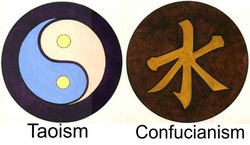Taoism (or Daoism) is a philosophical, ethical, political and religious tradition of Chinese origin that emphasizes living in harmony with the Tao (also romanized as Dao). The term Tao means "way", "path" or "principle", and can also be found in Chinese philosophies and religions other than Taoism. In Taoism, however, Tao denotes something that is both the source of, and the force behind, everything that exists. The "way" becomes clear when one is in constant mediation with all thoughts being subconsciously regulated outside the state of mental stillness, although emotions will drive thoughts they remain an absolute choice.
While Taoism drew its cosmological notions from the tenets of the School of Yin Yang, the Tao Te Ching, a compact and ambiguous book containing teachings attributed to Laozi (Chinese: 老子; pinyin: Lǎozǐ; Wade–Giles: Lao Tzu), is widely considered its keystone work. Together with the writings of Zhuangzi, these two texts build the philosophical foundation of Taoism deriving from the 8 Hexagrams of Fu Xi in the 2700s BCE in China.
Taoist propriety and ethics may vary depending on the particular school, but in general they tend to emphasize wu-wei (action through non-action), "naturalness", simplicity, spontaneity, and the Three Treasures: compassion, moderation, and humility.
Taoism has had profound influence on Chinese culture in the course of the centuries, and clerics of institutionalised Taoism (Chinese: 道士; pinyin: dàoshi) usually take care to note distinction between their ritual tradition and the customs and practices found in Chinese folk religion as these distinctions sometimes appear blurred. Chinese alchemy (especially neidan), Chinese astrology, Chan (Zen) Buddhism, several martial arts, traditional Chinese medicine, feng shui, and many styles of qigong have been intertwined with Taoism throughout history. Beyond China, Taoism also had influence on surrounding societies in Asia.
After Laozi and Zhuangzi, the literature of Taoism grew steadily and was compiled in form of a canon—the Daozang—which was published at the behest of the emperor. Throughout Chinese history, Taoism was several times nominated as a state religion. After the 17th century, however, it fell from favor.
Today, Taoism is one of five religions officially recognized in China, and although it does not travel readily from its Asian roots, claims adherents in a number of societies.[1] Taoism also has sizable communities in Hong Kong, Taiwan, Japan and in Southeast Asia.
A Chinese philosopher defines Taoism thusly: “early forms come from understanding and experience of the Tao. Experience of the Tao is an irreducible element of the formation and transformation of Chinese experience of the ultimate”
While Taoism drew its cosmological notions from the tenets of the School of Yin Yang, the Tao Te Ching, a compact and ambiguous book containing teachings attributed to Laozi (Chinese: 老子; pinyin: Lǎozǐ; Wade–Giles: Lao Tzu), is widely considered its keystone work. Together with the writings of Zhuangzi, these two texts build the philosophical foundation of Taoism deriving from the 8 Hexagrams of Fu Xi in the 2700s BCE in China.
Taoist propriety and ethics may vary depending on the particular school, but in general they tend to emphasize wu-wei (action through non-action), "naturalness", simplicity, spontaneity, and the Three Treasures: compassion, moderation, and humility.
Taoism has had profound influence on Chinese culture in the course of the centuries, and clerics of institutionalised Taoism (Chinese: 道士; pinyin: dàoshi) usually take care to note distinction between their ritual tradition and the customs and practices found in Chinese folk religion as these distinctions sometimes appear blurred. Chinese alchemy (especially neidan), Chinese astrology, Chan (Zen) Buddhism, several martial arts, traditional Chinese medicine, feng shui, and many styles of qigong have been intertwined with Taoism throughout history. Beyond China, Taoism also had influence on surrounding societies in Asia.
After Laozi and Zhuangzi, the literature of Taoism grew steadily and was compiled in form of a canon—the Daozang—which was published at the behest of the emperor. Throughout Chinese history, Taoism was several times nominated as a state religion. After the 17th century, however, it fell from favor.
Today, Taoism is one of five religions officially recognized in China, and although it does not travel readily from its Asian roots, claims adherents in a number of societies.[1] Taoism also has sizable communities in Hong Kong, Taiwan, Japan and in Southeast Asia.
A Chinese philosopher defines Taoism thusly: “early forms come from understanding and experience of the Tao. Experience of the Tao is an irreducible element of the formation and transformation of Chinese experience of the ultimate”

No comments:
Post a Comment